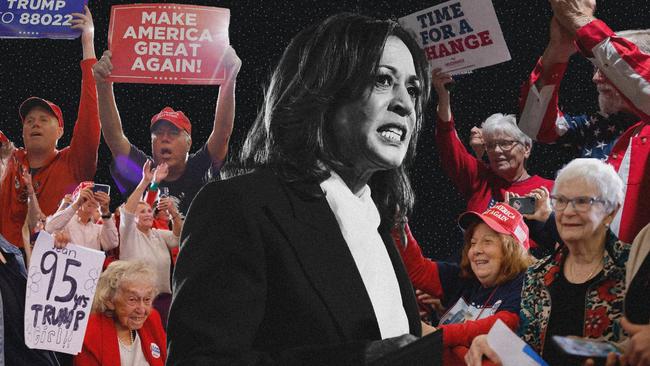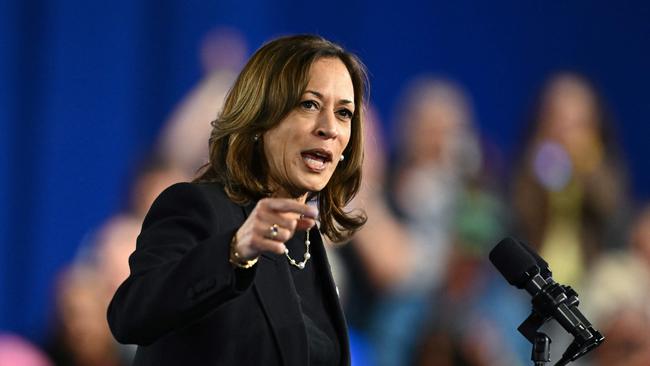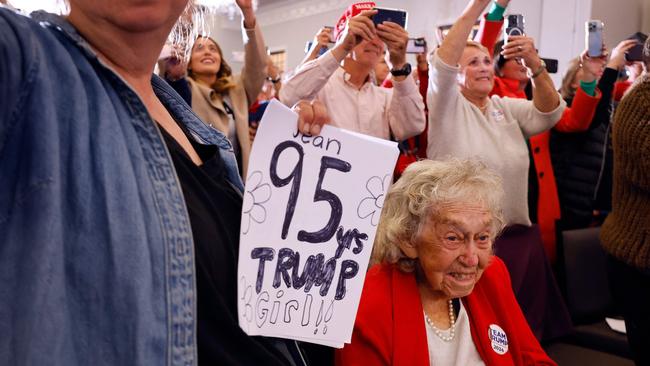Why older white voters are ditching Harris
The vice president and Democratic presidential candidate started strong with this usually Republican bloc. But now they’re switching back to Donald Trump.

The most decisive voter bloc this year is the most overlooked. Kamala Harris has spent the final weeks of the race chasing black, Hispanic and young voters, convinced that her struggles with them explain why she’s trailing. Yet if Donald Trump holds his lead, it will be because older white voters gave Ms. Harris a chance but decided in the end to back the former president.
The late swing among older and white voters jumps out in the Emerson College poll. On Aug. 15, less than a month after she became the Democratic nominee, Ms. Harris trailed Mr. Trump by 12 points among white voters and was tied with him among all voters 60 or older. Since then, these voters have fled from Ms. Harris. By Oct. 26, Mr. Trump led by 22 points among whites and 8 points among seniors.
Meanwhile, Mr. Trump’s support among blacks and Hispanics was flat, and his share of voters 18 to 29 rose by only 7 points. Yet he surpassed Ms. Harris for the first time in overall support during the same period, and now leads by 48.9% to 48.8%. In other words, older and white voters contributed much more to Mr. Trump’s recent rise than their younger and non-white peers.
What about all those headlines touting a shift among minorities and youngsters: “Why Democrats Are Struggling More With the Latino Vote,” “Male voters under 30 voting MAGA in 2024,” and so on?

That shift is real, but it has played out much more over the past eight years than the past few months. Compared with his 2016 and 2020 campaigns, Mr. Trump is drawing more support from groups that tend to lean Democratic, especially black and Hispanic men, and young white men too. Yet since Ms. Harris entered the race in July, most of Mr. Trump’s new support has come from older and white voters.
Progressive elites, who sniff racism and sexism around every corner, are wondering whether older whites have abandoned Ms. Harris because they can’t abide a black female president. A New York Times article last week mused about the trend. “Some Democrats fear that a segment of voters may be uncomfortable supporting Ms. Harris because of her gender or race, despite what those voters may profess to pollsters.”
In other words, progressives think some voters can’t be taken at their word when they criticise Ms. Harris on immigration, the economy and so on, because their critiques are only a smoke screen for their old-fashioned biases. With this theory, Democrats are preparing to blame a Harris loss on bigotry.
But prejudice can’t explain older whites’ recent flight from Ms. Harris, since she was already a black woman in August, when many more of them supported her. In fact, it’s likely that Ms. Harris’s race and sex were among the only things many voters knew about her at the start of her candidacy other than that she was vice president, and perhaps that she’s from California. Nonetheless, she initially held more support from older and white voters than President Biden did in the last polls before he left the race.

A better explanation is that many older whites originally welcomed Ms. Harris as an alternative to both Mr. Biden and Mr. Trump, then changed their minds once they got to know her better. That may have to do with the issues more than her image.
Daniel Cox, who studies public opinion at the American Enterprise Institute, believes that Ms. Harris’s progressive views have damaged her standing among seniors more than other voter groups. “When you embrace things like judicial reform, or defending the police and relocating funds to social service agencies, we see much higher rates of opposition from the oldest voters.” The same goes for immigration, which is one of the few top issues on which voters give Ms. Harris lower marks than Mr. Biden.
Losing older whites is politically painful, since they tend to turn out at a high rate. They’re also overrepresented in key states like Wisconsin and Michigan. Expect the press to hold its focus on young and minority voters all the way through Election Day. This year more than ever, that might miss the biggest story.
Mene Ukueberuwa is a member of the WSJ Editorial Board





